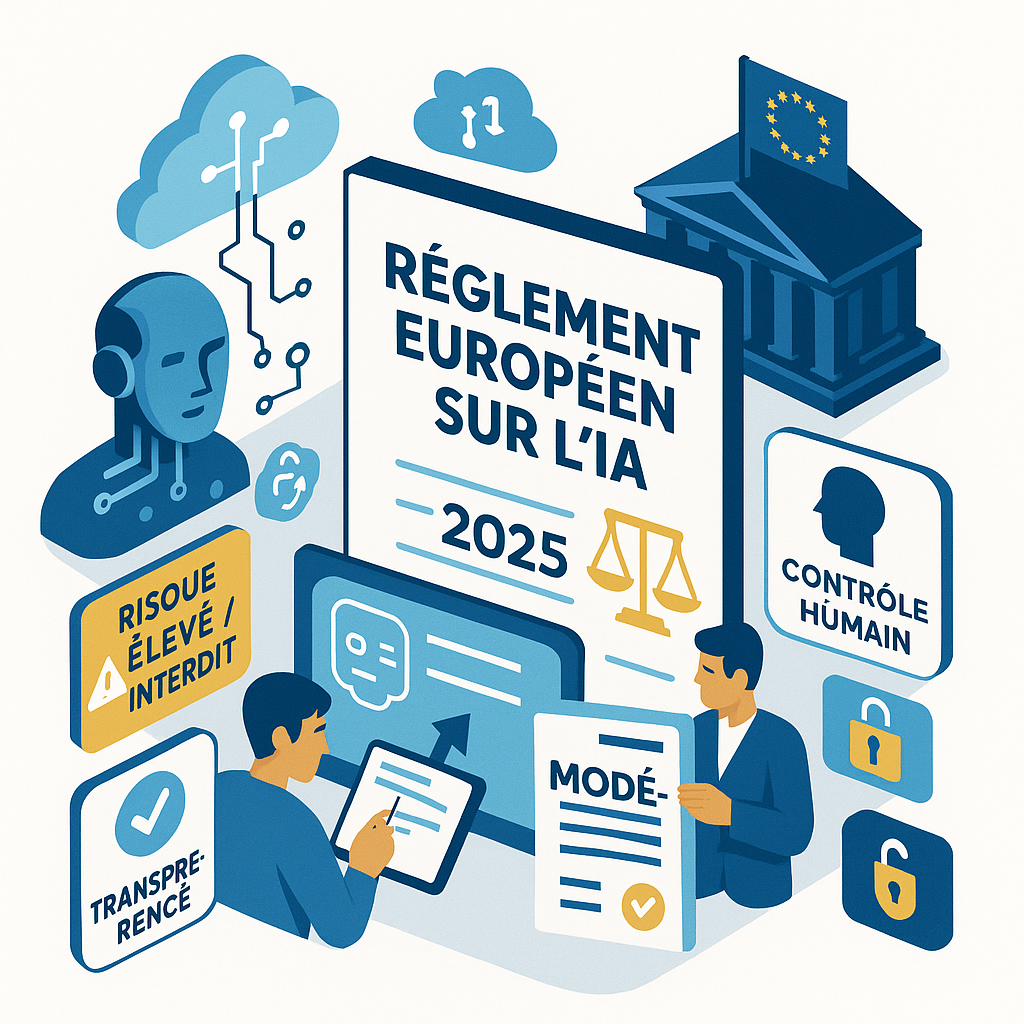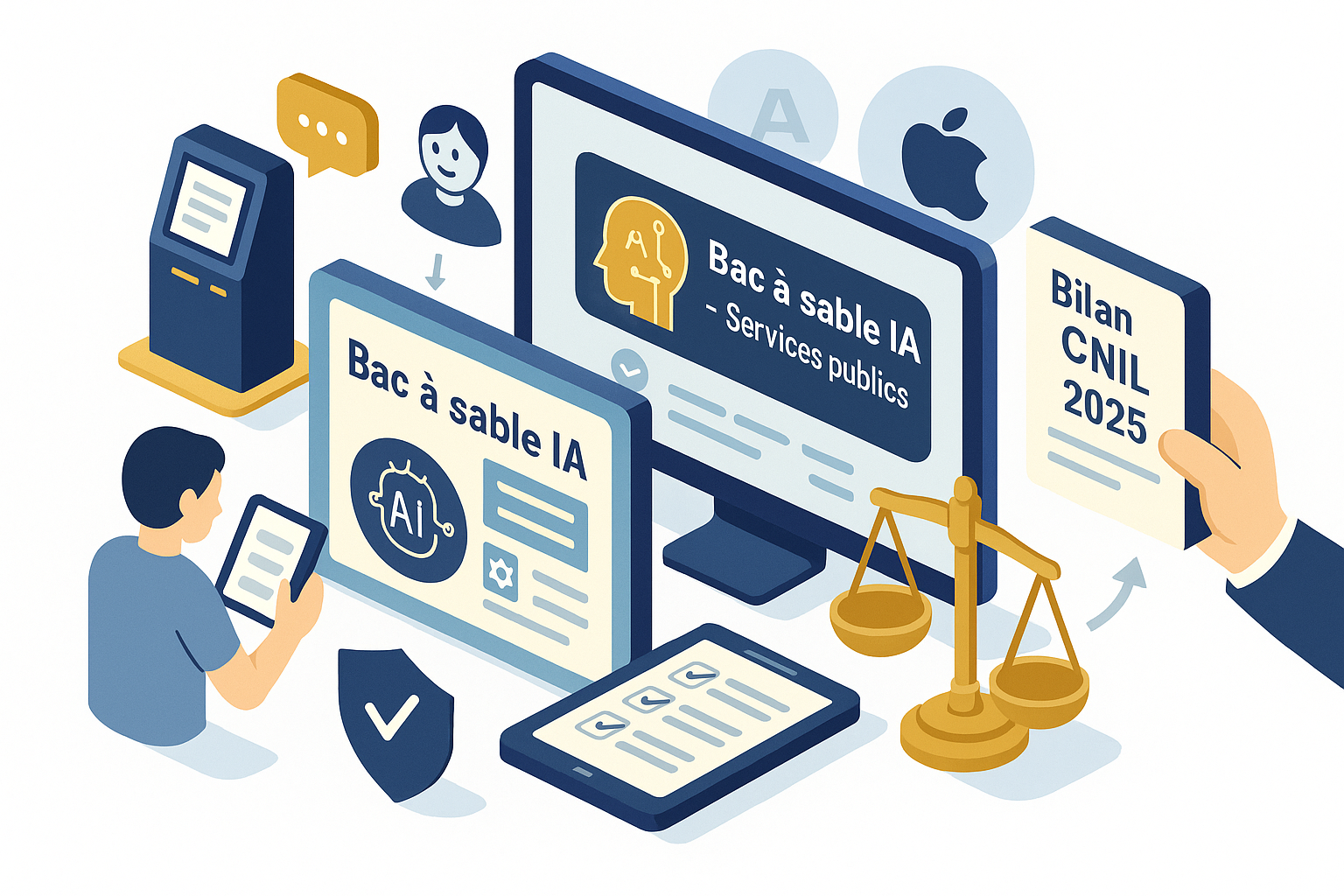
ACCOUNTING EXPERT - Generative AI and data protection: how to reconcile innovation and confidentiality? Cahier de l'académie n° 43
The meteoric rise of generative artificial intelligence is shaking up professional practices, particularly in AI for
Artificial intelligence is transforming businesses, but it is also raising major legal challenges. The AI Actcombined with the RGPD, imposes strict requirements on algorithm transparency, training data protection and accountability for automated decisions.
Our firm supports you in the compliant and secure integration of AI, helping you to protect your models, secure your contracts and anticipate regulatory risks. Rigorous compliance means you can innovate with peace of mind and avoid heavy penalties.

Artificial intelligence is profoundly transforming business models, but also poses major legal challenges.
TheEuropean AI Act establishes a strict framework to guarantee the transparency, reliability and compliance of AI systems.
As a company, ensuring the compliance of your AI algorithms and models is essential for :
✅ Reduce regulatory risks and avoid heavy penalties.
✅ Protect the privacy of training data and users.
✅ Ensure transparency and accountability of your automated decisions.
AI regulations are changing fast: our firm can help you anticipate legal obligations and integrate "compliance by design" right from the conception of your artificial intelligence solutions.

We dive deep into your artificial intelligence systems to identify the legal and technical risks associated with your algorithms.
Our methodical approach examines:
✅ The transparency and explicability of automated decisions
✅ Compliance with the requirements of the AI Act and the RGPD
✅ The rights and obligations associated with the protection of training data
You will receive a detailed report with concrete recommendations for securing your AI models from a legal standpoint.

After the analysis, we draw up a customized action plan to ensure the compliance of your artificial intelligence solutions.
In particular, we work on:
🔹 Drafting and securing AI contracts (development, license, partnership)
🔹 Protecting models and training data
🔹 Legal framing of automated decisions and algorithmic bias
🔹 Compliance with transparency and explicability obligations.
Our aim: to enable you to innovate with peace of mind, while ensuring robust compliance.

The adoption of artificial intelligence requires appropriate training for your teams.
We offer interactive sessions to:
📌 Understand the legal and regulatory issues of AI
📌 Master best practices for ethical and compliant development
📌 Anticipate the risks of using AI in business
Thanks to our dual legal and technical expertise, we can translate regulatory requirements into concrete actions tailored to your needs.

The regulatory framework for AI is evolving rapidly: we support you in a proactive legal watch to anticipate new obligations.
Our services include:
📍 Updating policies and contracts in line with legal developments
📍 Regular audits to ensure sustainable compliance
📍 Support on the evolution of IA's responsibility and ethics standards.

Artificial intelligence is now governed by strict regulations, and non-compliance with theEuropean AI Act exposes companies to major legal and financial risks.
The penalties for non-compliance with legal obligations are severe:
💰 Fines of up to 35 million euros or 7% of worldwide annual sales
⚠️ Ban on marketing non-compliant AI systems
📌 Obligation to comply immediately under penalty of fines
TheAI Act classifies artificial intelligence systems into different risk categories, imposing specific requirements in terms of transparency, security and user rights.

The meteoric rise of generative artificial intelligence is shaking up professional practices, particularly in AI for

In a world where artificial intelligence (AI) is becoming unavoidable, the European Regulation on AI (RIA)

Artificial intelligence (AI) is set to profoundly transform public services, and the
Artificial intelligence (AI) is a field of computer science that aims to create systems capable of performing tasks that generally require human intelligence. This includes functions such as speech recognition, natural language understanding, decision-making and visual perception. The applications of AI are vast, encompassing sectors such as healthcare, finance, education and many others.
Machine learning is a sub-discipline of AI that enables machines to learn from data and improve their performance without being explicitly programmed. Deep learning is a subset of machine learning that uses multi-layered artificial neural networks to analyze complex data. While machine learning can process both structured and unstructured data, deep learning is particularly effective for processing large quantities of unstructured data, such as images and sounds.
Generative AI is a branch of artificial intelligence that uses algorithms to create new content, such as text, images or music. It works by relying on deep learning models, notably neural networks, which analyze large datasets to learn underlying structures and patterns. Once trained, generative AI can produce original content based on assimilated data, opening up innovative perspectives in a variety of creative and professional fields.
Artificial intelligence offers many benefits, such as the automation of repetitive tasks, improved operational efficiency, personalized services and predictive analysis. However, it also presents risks, notably in terms of data confidentiality, algorithmic biases, job losses in certain sectors and increased dependence on technology. It is essential to develop and use AI ethically and responsibly to maximize its benefits while minimizing its drawbacks.
As a lawyer specializing in emerging technologies, I observe on a daily basis how artificial intelligence will redefine the contours of innovation in 2025. My firm, based in the heart of Paris, helps companies meet the major challenge of combining technical performance with legal compliance. The adoption of the European AI Act marked a decisive turning point, placing regulatory compliance at the heart of innovation strategies. Against this backdrop, artificial intelligence law has become a discipline in its own right, requiring the cutting-edge expertise that our firm is committed to developing.
My background as a web development lawyer has enabled me to develop a unique approach. What sets our firm apart is its ability to combine legal and technical expertise. As a specialized lawyer, I don't just interpret legal texts - I intimately understand the technical challenges faced by development teams. This dual expertise enables me to analyze your algorithms in depth, while anticipating their legal implications.
The compliance of your artificial intelligence solutions raises complex issues that require a holistic understanding of new technology law. The intellectual property of your models, the protection of training data, and your responsibilities in terms of automated decisions are all subjects where technology and law intertwine. My expertise as an artificial intelligence lawyer enables you to tackle these issues with confidence, combining innovation and legal certainty.
Regulatory compliance is the bedrock of any responsible AI project. As an expert lawyer, my support covers all the requirements of the European AI Act and the RGPD, from the initial audit of data processing processes to the privacy impact assessment. The technical and legal documentation I produce translates the complexity of your solutions into clear, compliant terms.
Protecting your intellectual property is a crucial issue. I can help you draft your development contracts, define the conditions of use of your solutions, and secure your innovations. I pay particular attention to the thorny issue of ownership of creations generated by AI, with contractual solutions tailored to your needs.
Ethics and responsibility form the third pillar of my intervention. The supervision of algorithmic bias, the transparency of automated decisions, and the definition of ethical governance are all subjects I approach with pragmatism. Legal risk management is based on a detailed understanding of the underlying technical issues.
Start-ups and scale-ups benefit from support focused on securing their innovation. Our firm ensures compliance right from the design stage, providing optimum protection for intellectual property. My expertise as a lawyer is particularly valuable when it comes to fund-raising, where the legal soundness of your solutions becomes a powerful argument.
For companies undergoing transformation, I ensure the secure integration of AI into your existing processes. Team training and gradual process compliance go hand in hand with controlled management of legal change. The aim is to enable a smooth and compliant transformation.
Solution providers find in me a partner capable of auditing their algorithms and validating the conformity of their models. The drafting of license agreements and technical and legal documentation benefits from my dual expertise as a lawyer specialized in digital law, guaranteeing optimal understanding by all stakeholders.
My support begins with an in-depth audit combining technical and legal analysis. The review of code and algorithms is accompanied by a thorough validation of regulatory compliance. Potential risks are identified and concrete recommendations are formulated, leading to a clear roadmap for compliance.
Team training is an essential part of my work. Tailored sessions raise your staff's awareness of the legal challenges of AI, while passing on good development practices. The "compliance by design" approach thus becomes second nature to your teams.
I'd like to offer you a free 15-minute initial discussion to explore your issues together and define a suitable support strategy. This discussion will enable us to identify your specific needs, assess potential risks, and outline a concrete action plan.